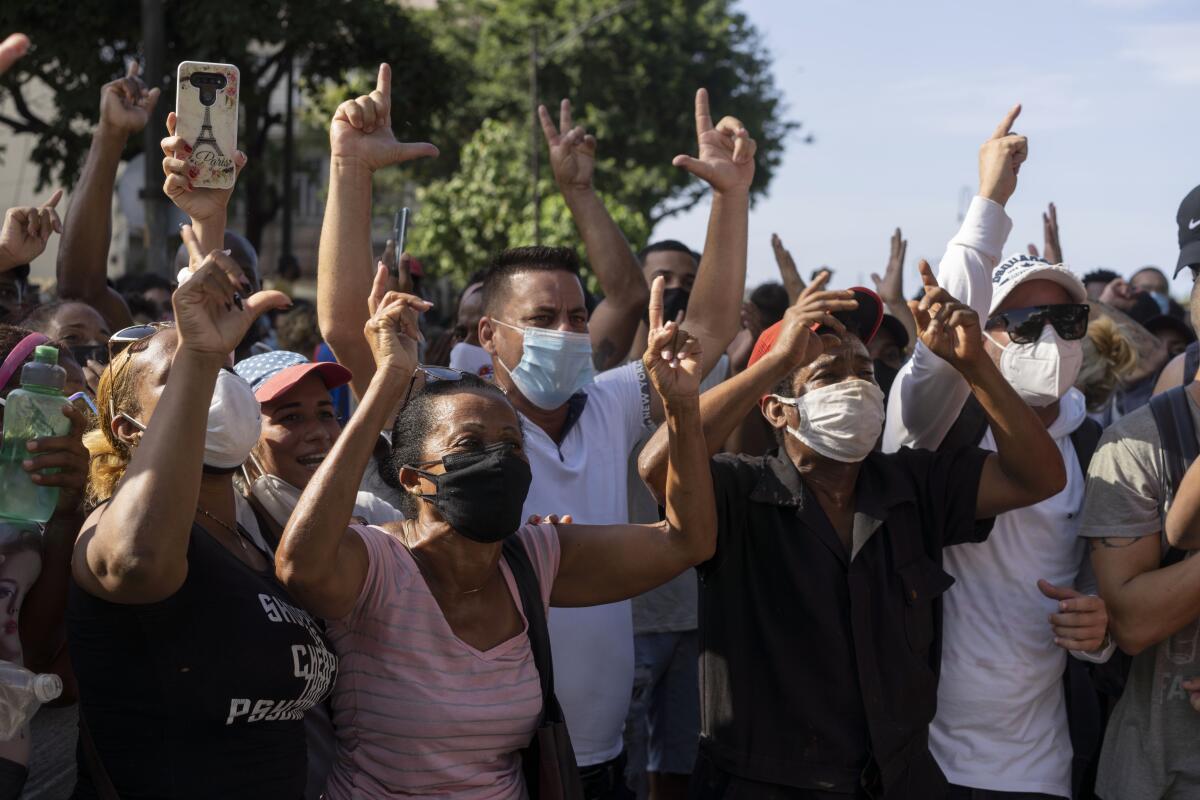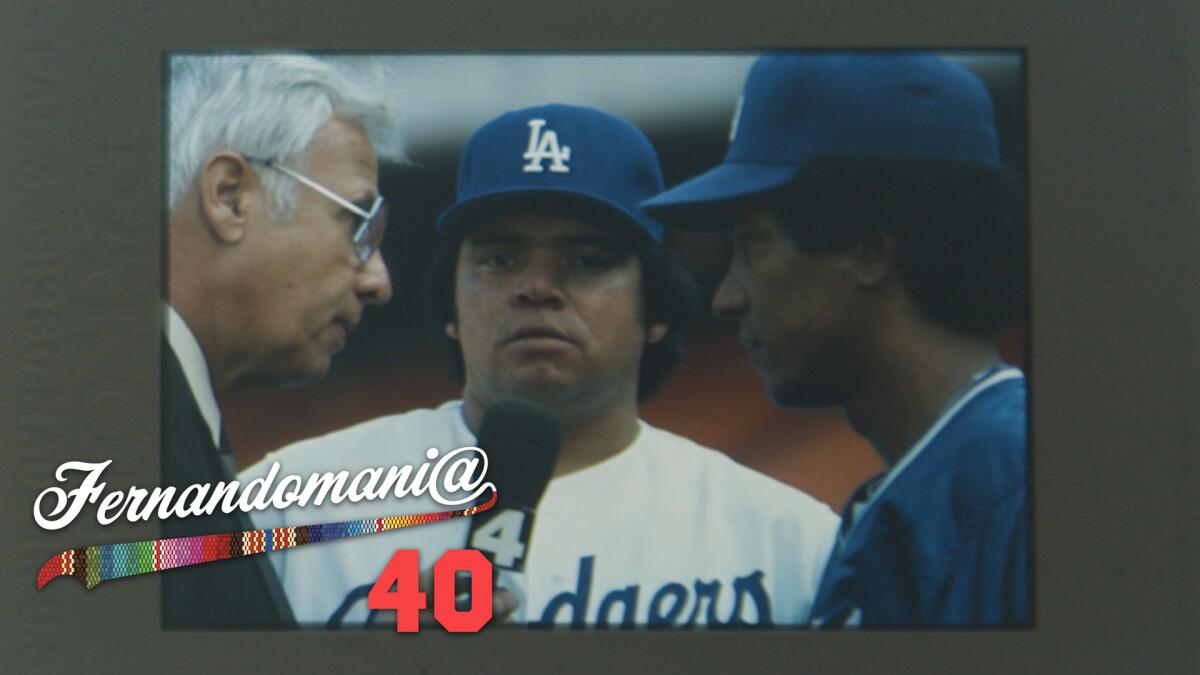Latinx Files: The protest in Cuba, and what happens next?

- Share via
It was all sparked by a power outage and decades of bottled-up frustration.
On Sunday morning, hundreds of residents of San Antonio de los Baños, a town outside Havana, took to the streets to decry the constant electricity shortages that have made a hot and humid Caribbean summer even worse. The protest was broadcast live on social media, and soon the cries of “No tenemos miedo!” spread throughout the island.
According to Periodismo del Barrio, an independent Cuban news outlet, more than 70 anti-government protests have been confirmed to date. These are the largest such demonstrations in Cuba since the Maleconazo, the 1994 uprising that took place during “el periodo especial,” in which Cubans faced years of famine and a crumbling economy after the collapse of the Soviet Union in 1991. Three decades later and amid a global pandemic, Cubans find themselves in a similar situation.
“Me fui a la calle porque estoy aburrida de pasar hambre, de pasar trabajo,” said Sara Naranjo in a video shared on Twitter. “No tengo agua, no tengo nada.”
The Latinx experience chronicled
Get the Latinx Files newsletter for stories that capture the multitudes within our communities.
You may occasionally receive promotional content from the Los Angeles Times.
One major difference between now and then is the arrival of the internet to the island. In December 2018, the Cuban government rolled out a 3G mobile network, connecting many residents for the first time ever. That same network is what helped spread the protests across Cuba. It’s no surprise that the government blocked access on Monday.
“Our weapon is the internet. If they take away the internet, we are unarmed,” Gino Ocumares of Havana told Reuters. “The government does not want people to see the truth.”
But by then it was too late. Though there has been an intermittent internet blackout in Cuba since Monday, videos of the protests and the ensuing state violence and police brutality — one person has been confirmed dead — had already been shared across the globe.
It’s unclear what will happen next, but it’s hard not to feel as though we’re on the cusp of witnessing history.
“I think the Communists have lost control, they won’t have a solution to this situation,” Waldo Herrera, a Havana resident, said. “The people are tired of so much humiliation, so much repression.”
Now we all wait. The Cuban people aren’t going to simply go back to their day-to-day life of trying to “resolver” for their basic needs. And the government shows no signs of backing down. There is desperation on both sides, and that doesn’t bode well for the next couple of weeks.
Consider subscribing to the Los Angeles Times
Your support helps us deliver the news that matters most. Become a subscriber.
What has been the reaction in the United States to what’s happening in Cuba?
President Biden offered solidarity with the protesters on Monday.
“We stand with the Cuban people and their clarion call for freedom,” he said.
“The United States calls on the Cuban regime to hear their people and serve their needs at this vital moment rather than enriching themselves.”
As my colleague Tracy Wilkinson points out, the Biden administration sees very little upside in normalizing relations and undoing policies enacted by former President Trump that further sanctioned Cuba. Biden admitted as much, acknowledging in March that Cuba was not a top priority. Sunday’s protests probably changed all that.
Meanwhile, Florida Gov. Ron DeSantis said he was looking to get Cuba back online after the government blocked access to social media accounts and cellular data were spotty.
“We have companies on the Space Coast that launch these things,” he said on Tuesday without offering a plan on how he would get it done.
The desire to do something, anything, is very palpable among some Cuban Americans. The Miami Herald reported that a group had planned to take a flotilla carrying supplies from Miami to Cuba.
“We’re going to Havana. If we have to intervene, if we have to stay, we’ll do what we have to do,” Santiago Rivero, one of the organizers, said. “The [U.S.] president has done nothing, supposedly. At a minimum, we want to stand at the border of what are the Havana limits.”
That expedition never materialized.
Following what is happening in Cuba is hard given the misinformation found on social media. Two sites run by Cubans on the island provide reliable coverage of what is actually happening. Periodismo del Barrio, run by journalist Elaine Diaz, has specialized in local coverage from the perspective of the average Cuban living on the island. 14ymedio.com is dissident Yoani Sanchez’s site that has taken a more critical approach to the current Cuban government.
Fernandomania @ 40: How the media fell in love with Fernando Valenzuela

The latest installment of our multi-part documentary series “Fernandomania @ 40” is out today. You can watch here.
Episode 8 of the series explores the media’s infatuation with Fernando Valenzuela. Throngs of reporters followed his every move, through every city. Though Valenzuela didn’t himself speak English and didn’t reveal much, his impact nevertheless prompted publications like the Los Angeles Times to reassess its coverage of underserved communities in Southern California.
Missed an episode? You can catch up by heading to our special “Fernandomania @ 40” section.
Things we read this week we think you should read
— NPR has the story on how “Patria y Vida,” a song released in February, became the anthem of the Cuban protests.
— Congratulations to Mj Rodriguez! The “Pose” star became the first openly transgender actor to receive an Emmy nomination for a leading role. Rodriguez was one of six Latinxs to be nominated for an Emmy this year — the others are Lin-Manuel Miranda and Anthony Ramos (nominated for “Hamilton”), Anya Taylor-Joy (“The Queen’s Gambit”), Rosie Perez (“The Flight Attendant”) and Alexis Bledel (“The Handmaid’s Tale”). This is the first time any Latinx actor has been nominated for an Emmy in the last six years.
— For the New Yorker, Abby Aguirre wrote about Oscar “Zeta” Acosta, the Chicano activist and writer who served as the inspiration for the character of Dr. Gonzo in Hunter S. Thompson’s “Fear and Loathing in Las Vegas,” and how the book doesn’t do him justice.
The Latinx experience chronicled
Get the Latinx Files newsletter for stories that capture the multitudes within our communities.
You may occasionally receive promotional content from the Los Angeles Times.








